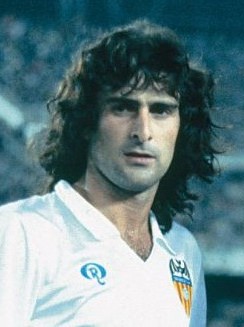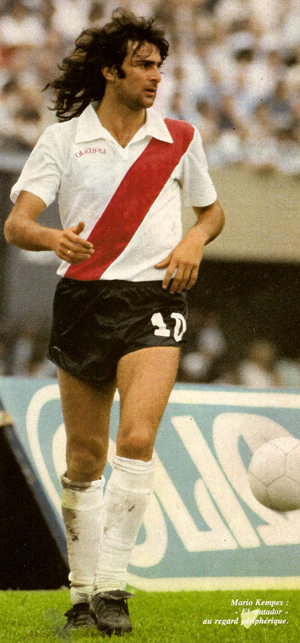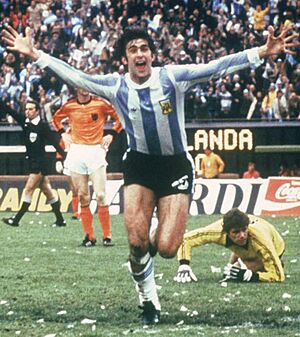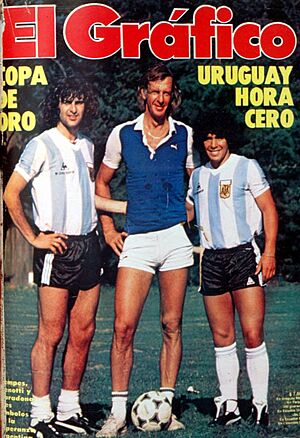Mario Kempes facts for kids

Kempes with Valencia in 1982
|
||||||||||||||||
| Personal information | ||||||||||||||||
|---|---|---|---|---|---|---|---|---|---|---|---|---|---|---|---|---|
| Full name | Mario Alberto Kempes Chiodi | |||||||||||||||
| Date of birth | 15 July 1954 | |||||||||||||||
| Place of birth | Bell Ville, Argentina | |||||||||||||||
| Height | 1.84 m (6 ft 0 in) | |||||||||||||||
| Position(s) | Striker, attacking midfielder | |||||||||||||||
| Youth career | ||||||||||||||||
| 1961–1968 | Club Atlético y Biblioteca Bell | |||||||||||||||
| 1968–1969 | Talleres | |||||||||||||||
| 1969–1970 | Instituto | |||||||||||||||
| Senior career* | ||||||||||||||||
| Years | Team | Apps | (Gls) | |||||||||||||
| 1970–1973 | Instituto | 13 | (11) | |||||||||||||
| 1973–1976 | Rosario Central | 107 | (85) | |||||||||||||
| 1976–1981 | Valencia | 142 | (95) | |||||||||||||
| 1981–1982 | River Plate | 29 | (15) | |||||||||||||
| 1982–1984 | Valencia | 42 | (21) | |||||||||||||
| 1984–1986 | Hércules | 38 | (10) | |||||||||||||
| 1986–1987 | First Vienna | 20 | (7) | |||||||||||||
| 1987–1990 | St. Pölten | 96 | (34) | |||||||||||||
| 1990–1992 | Kremser SC | 39 | (7) | |||||||||||||
| 1993–1994 | Pelita Jaya | 18 | (12) | |||||||||||||
| 1995 | Fernández Vial | 11 | (5) | |||||||||||||
| 1996 | Lushnja | |||||||||||||||
| Total | 555 | (302) | ||||||||||||||
| International career | ||||||||||||||||
| 1973–1982 | Argentina | 43 | (20) | |||||||||||||
| Managerial career | ||||||||||||||||
| 1995–1996 | Pelita Jaya | |||||||||||||||
| 1996 | Lushnja (player-manager) | |||||||||||||||
| 1997–1998 | Mineros de Guayana | |||||||||||||||
| 1999 | The Strongest | |||||||||||||||
| 2000 | Blooming | |||||||||||||||
| 2000–2001 | Independiente Petrolero | |||||||||||||||
| 2001–2002 | Casarano | |||||||||||||||
| 2002 | San Fernando | |||||||||||||||
|
Medal record
|
||||||||||||||||
| *Club domestic league appearances and goals | ||||||||||||||||
Mario Alberto Kempes Chiodi is a famous Argentine football player. He was born on July 15, 1954. He played as a striker or attacking midfielder. He was known for scoring many goals. He was the top goalscorer in Spain's La Liga twice while playing for Valencia. He scored 116 goals in 184 league games for them. Many people think he is one of the greatest football players of all time.
Mario Kempes was a key player for Argentina when they won the 1978 FIFA World Cup. He scored two goals in the final match. He also won the Golden Boot for being the top goalscorer in that tournament. He received the Golden Ball as the best player of the tournament. He is one of only three players to win all three awards at a single World Cup. The others are Garrincha (1962) and Paolo Rossi (1982).
In 1978, Kempes was named the South American Footballer of the Year. He also won the Onze d'Or European Footballer of the Year award. In 2004, FIFA named him one of the Top 125 greatest living footballers. People called him El Toro (The Bull) and El Matador (The Killer).
Contents
Mario Kempes's Football Journey
Early Days and Rising Star

Mario Kempes was born in Bell Ville, Córdoba, Argentina. He started playing football at age seven. By fourteen, he joined the reserves team of Talleres.
His professional career began at Instituto. He then moved to Rosario Central, where he became a fantastic goalscorer. He scored 85 goals in 105 matches. This impressive performance led Valencia in Spain to sign him.
Success with Valencia
At Valencia, Kempes helped his team win important trophies. These included the Copa del Rey, the European Cup Winners' Cup, and the UEFA Super Cup. He also won the Pichichi Trophy twice in a row. This award is for the top goalscorer in La Liga. He scored 24 goals in the 1976–77 season and 28 goals in the 1977–78 season.
Kempes was known as a hard-working forward. He often shot from outside the penalty area and made strong runs towards the goal. He was not a typical center-forward who stayed only inside the box. Many defenders found it hard to stop his attacking style.
Playing for Argentina
Before the 1978 FIFA World Cup, Mario Kempes was the only player in Argentina's national team who played for a foreign club. The coach, César Luis Menotti, said Kempes was strong, skilled, and could create space and shoot hard. He believed Kempes could make a big difference.
Kempes had been the top scorer in La Liga for two seasons. He wanted to prove himself at the World Cup held in his home country. He had not scored in the 1974 World Cup when he was 19. In the first round of the 1978 tournament, he still hadn't scored. But he soon changed that!
After leaving Valencia in 1984, Kempes played for Hércules for two years. He then spent six years playing for different clubs in Austria. Later in his career, he played for clubs in Indonesia, Chile, and Albania.
International Achievements
Mario Kempes played 43 games for the Argentine national team and scored 20 goals. He played in three World Cups: 1974, 1978, and 1982. He helped Argentina win the World Cup in 1978.
He was the top goalscorer in the 1978 tournament with six goals. He scored two goals in three different matches:
- Two goals against Poland in the semi-final group stage.
- Two goals against Peru.
- Two goals in the final against the Netherlands, which Argentina won 3–1. His second goal in the final was the winning goal in extra time.
In the same tournament, he famously stopped a goal with his hand in a match against Poland. This led to a penalty kick, which was saved by Ubaldo Fillol. His goals in the 1978 World Cup Final were his last for Argentina. He was only 23 years old at the time.
In 1978, he was named the South American Football Player of the Year. In March 2004, the legendary player Pelé included him in his list of the top 125 greatest living footballers.
Life After Playing: Coaching and Commentating
Managerial Roles
After his playing career, Kempes became a football manager. His first full-time managing job was in Albania with Lushnja. He made history there by signing the first foreign player in Albanian football.
He later managed teams in Venezuela, Bolivia, and Indonesia. He also worked as an assistant coach for Héctor Núñez at Valencia.
Football Analyst and Commentator
Today, Mario Kempes works as a football analyst and commentator. He provides commentary in Spanish for ESPN Deportes, which is ESPN's Spanish-language channel.
He also provides commentary for the Latin American versions of the popular FIFA video games. He has been a commentator for these games from FIFA 13 up to FIFA 23. He continues this role for the EA Sports FC series, starting with EA Sports FC 24.
Awards and Recognition
Team Honours
- Rosario Central
- Primera División runner-up: 1974 Metropolitano, 1976 Nacional
- Valencia
- Copa del Rey: 1978–79
- UEFA Cup Winners' Cup: 1979–80
- UEFA Super Cup: 1980
- River Plate
- Primera División: 1981 Nacional
- Pelita Jaya
- Galatama: 1993–94
- Argentina
- FIFA World Cup: 1978
Individual Awards
- Argentine Primera División top scorers: 1974 Nacional, 1976 Metropolitan
- Pichichi Trophy: 1977, 1978
- FIFA World Cup Golden Boot: 1978
- FIFA World Cup Golden Ball: 1978
- FIFA World Cup All-Star Team: 1978
- Ballon d'Or: 1978
- Onze d'Or: 1978
- Olimpia de Plata: 1978
- South American Footballer of the Year: 1978
- UEFA Cup Winners' Cup top scorers: 1979–80
- FIFA 100: 2004 (named one of the top 125 greatest living footballers)
- Golden Foot: 2007 (as a football legend)
- Estadio Mario Alberto Kempes: In 2010, the stadium in Córdoba, Argentina was named after him.
- AFA Team of All Time (published 2015)
- IFFHS Argentina All Times Dream Team (Team B): 2021
See also
 In Spanish: Mario Kempes para niños
In Spanish: Mario Kempes para niños
 | Toni Morrison |
 | Barack Obama |
 | Martin Luther King Jr. |
 | Ralph Bunche |



